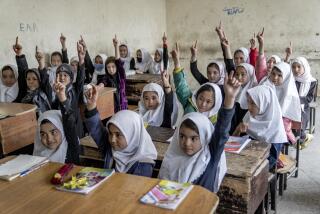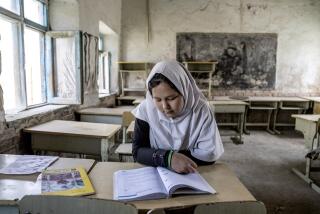Pakistan police rescue chained students from <i>madrasa</i>
- Share via
Reporting from Islamabad, Pakistan, and New Delhi — Pakistani police rescued about 68 students from an Islamic seminary in Karachi, several of whom were reportedly chained in a basement, denied food and pressured to join the Taliban, officials said Tuesday.
It wasn’t immediately clear why the students, some as young as 12 and some in their 40s, were subjected to such treatment. But police, who conducted the raid late Monday after a tip from neighbors, told local news media that some of the students were drug addicts sent there by parents or other relatives unaware of the horrible conditions.
TV reports showed boys and men constrained by heavy chains on their ankles. Other shots showed several celebrating after being freed.
“They gave us jihad training,” one of the students told television reporters. “They warned us if we ever tried to escape, we would be severely punished.”
At least two staff members at the Madrasa Zakarya were arrested, although the leader of the seminary in Karachi’s Sohrab Goth neighborhood reportedly escaped. The Interior Ministry has ordered an investigation.
“These young people were chained,” Interior Minister Rehman Malik told reporters. “They were brainwashed. The aggression these people felt toward society, other people, you can’t expect them to feel particularly positive.”
Government statistics suggest there are more than 15,000 madrasas, or religious schools, in Pakistan educating about 2 million students. Most parents who send their children to madrasas, some of which have a reputation for fomenting extremism, do so because they generally cost less than other schools, provide meals and have teachers who show up.
Nazish Brohi, a sociologist and women’s rights activist in Karachi, said corporal punishment and abuse happen in mainstream schools as well as madrasas, even though such conduct is illegal.
“The problem is that all efforts at regulating madrasas have failed,” she said, adding that the government isn’t very strong on oversight over all sorts of institutions.
Although there has been slight improvement in madrasa oversight — largely focused on trying to prevent them from sending their students to Afghanistan or Pakistani tribal areas to become fighters — it hasn’t extended to the curriculum or the quality of education, experts said.
“This isn’t the first time they’ve found students chained, although it may be the first time it’s been running live on TV,” Brohi said. “My concern, with the shock and horror of this case, is that people will focus on this one incident rather than the wider issue of oversight.”
Special correspondent Khan reported from Islamabad and Times staff writer Magnier from New Delhi.
More to Read
Sign up for Essential California
The most important California stories and recommendations in your inbox every morning.
You may occasionally receive promotional content from the Los Angeles Times.










